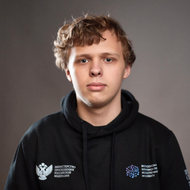HSE Students Win International Olympiad in Artificial Intelligence

In the finals of the olympiad, the Russian team competed with 300 talented schoolchildren from 61 countries, including Australia, Brazil, Hungary, China, Mexico, the United Arab Emirates, Poland, Serbia, Singapore, the USA, Sweden, and Japan. The finals included team and individual rounds. In the team round, the Russian team made it into the top 10, winning a silver medal. In the individual competition, Russian schoolchildren won six gold medals, one silver, and one bronze.
Danis Dinmukhametov, graduate of School No. 2107 (Moscow), and Andrey Khlopotnykh, graduate of Physics and Mathematics Lyceum No. 30 (St Petersburg) are among the gold winners. This year they enrolled in the Bachelor's Programme in Applied Mathematics and Information Science at the HSE Faculty of Computer Science. Artyom Mazur, silver winner of IOAI 2025 and graduate of Gazprombank School (Moscow), will also study on this programme.

Danis Dinmukhametov
I’m interested in artificial intelligence firstly because it represents the junction of mathematics and programming, two of my favourite areas, and secondly, this area gives me an opportunity to combine advanced technologies with solving everyday problems. I've been participating in olympiads for several years—I made this decision after I had the idea to study at a good university and realised that I needed serious achievements on a national and international scale,’ says Danis Dinmukhametov.
His impressions of IOAI are positive. He says that the event was very well organised, given that this is the second time the olympiad has been held. ‘China was welcoming. In terms of difficulties, I would mention the rather high competition, time limits, and stress when you can’t solve the task for a long time. I liked the tasks as a whole—they are exactly what they should be at events like this, or close to it,’ said the winner. ‘Upon admission, I spent a long time choosing between MIPT and HSE University. As a result, I chose the HSE Faculty of Computer Science, as it combines three important factors: a high level of teaching in fundamental sciences, an excellent student community, and a convenient location in the city centre.’
Danis Dinmukhametov plans to continue to participate in various olympiads and competitions. ‘In addition, I plan to conduct research. I’m going to enrol in the AI360: Artificial Intelligence Engineering research track, which will help me in this,’ said the student.

Andrey Khlopotnykh
The field of artificial intelligence appealed to Andrey Khlopotnykh because it combines mathematics and computer science. ‘I started participating in AI olympiads from the ninth grade,’ he said. ‘IOAI was a success for me; I managed to win a gold medal in the individual competition, as well as take second place in the team competition. Upon admission, I chose the Faculty of Computer Science, as I believe that it provides the best education in the field of artificial intelligence. In the future, I plan to continue participating in AI competitions, as well as try my hand at research.’

Artyom Mazur
The field of AI is quite young and provides great opportunities for research, says Artyom Mazur. ‘I like the fact that this is the cutting edge of modern science, where there is still a lot left unexplored, which means there is an opportunity to contribute to its development,’ said Artyom. ‘I started participating in AI olympiads in the 11th grade. Despite the fact that this was my first olympiad season in this field, I managed win several all-Russian olympiads. The olympiad in Beijing turned out to be an incredibly rewarding experience for me. It was interesting to assess the level of competitive machine learning in other countries, as well as to work on non-trivial tasks. The time limit turned out to be the most difficult part for me: six hours for three tasks is quite short period of time when I have a lot of hypotheses in my head that need to be tested.’
Artyom Mazur chose HSE University for several reasons. ‘First of all, the teaching staff here is strong. Secondly, I’ll have an opportunity to study AI science from the very first year. And thirdly, it brings together enthusiastic and talented students. In the future, I would like to focus on research — this is the most interesting and useful activity for me,’ said the student.
See also:
‘Neural Networks Can Provide Assessments As Accurate As Humans’
Voice assistants have become part of everyday life. They can plan routes, play music and films, and answer questions. But the quality of their speech requires assessment. To address this, students of the Applied Artificial Intelligence Workshop at the HSE University and VK Engineering and Mathematics Schoolhave developed neural networks capable of evaluating speech synthesis.
HSE to Entrust Routine CPD Programme Development to AI
HSE University, together with the EdTech company CDO Global, is launching AI-based constructors to streamline the design of continuing professional development (CPD) courses. The new service will automate the preparation of teaching materials and assessment tools, significantly reducing the time and resources required of lecturers and instructional designers.
HSE University Becomes Absolute Leader in AI Alliance Ranking of Universities
TheAI Alliance Russia has announced a new ranking of Russian universities based on the quality of education in the field of AI. A total of 203 universities from 68 Russian regions participated in the ranking. HSE University was the first to join the highest A++ group.
HSE University and MTS Join Forces to Combat Deepfakes and Train AI to Create Bespoke Video Content
HSE University and MTS Web Services (MWS) have announced the launch of a series of joint research initiatives in the field of artificial intelligence technologies. These efforts aim to develop innovative solutions in cybersecurity, multimodal content generation, and big data analysis. The project’s leading institution is the HSE Tikhonov Moscow Institute of Electronics and Mathematics (HSE MIEM), under the overall coordination of the HSE AI Research Centre.
HSE University Brings Together Researchers at International AI Summer Institute in Shanghai
In early July 2025, the International Summer Institute on Artificial Intelligence in Education took place in Shanghai. It was organised by the HSE Institute of Education in cooperation with East China Normal University (ECNU). More than 50 early-career researchers and keynote speakers from nine countries—ranging from Russia and China to Canada and Singapore—gathered to share the latest findings from their work and to forge new international partnerships.
‘Economic Growth Without the AI Factor Is No Longer Possible’
The International Summer Institute on AI in Education has opened in Shanghai. The event is organised by the HSE Institute of Education in partnership with East China Normal University (ECNU). More than 50 participants and key speakers from over ten countries across Asia, Europe, North and South America have gathered to discuss the use of AI technologies in education and beyond.
Recommender Systems: New Algorithms and Current Practices
The AI and Digital Science Institute at the HSE Faculty of Computer Science hosted a conference focused on cutting-edge recommender system technologies. In an atmosphere of active knowledge sharing among leading industry experts, participants were introduced to the latest advancements and practical solutions in recommender model development.
AI to Enable Accurate Modelling of Data Storage System Performance
Researchers at the HSE Faculty of Computer Science have developed a new approach to modelling data storage systems based on generative machine learning models. This approach makes it possible to accurately predict the key performance characteristics of such systems under various conditions. Results have been published in the IEEE Access journal.
AI Predicts Behaviour of Quantum Systems
Scientists from HSE University, in collaboration with researchers from the University of Southern California, have developed an algorithm that rapidly and accurately predicts the behaviour of quantum systems, from quantum computers to solar panels. This methodology enabled the simulation of processes in the MoS₂ semiconductor and revealed that the movement of charged particles is influenced not only by the number of defects but also by their location. These defects can either slow down or accelerate charge transport, leading to effects that were previously difficult to account for with standard methods. The study has been published in Proceedings of the National Academy of Sciences (PNAS).
‘Services Must Be Flexible’: How Governments Can Use Artificial Intelligence
The HSE International Laboratory for Digital Transformation in Public Administration held a roundtable titled ‘Artificial Intelligence in Public Administration: Current Trends.’ Scholars from Israel, China, and Russia discussed which public services AI can enhance and what key factors must be considered when adopting new technologies.


